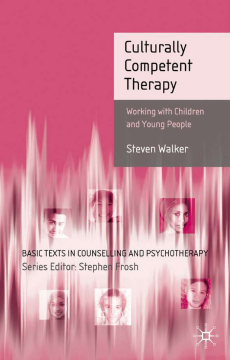
Additional Information
Book Details
Abstract
This book seeks to liberate and empower practitioners seeking to meet the needs of all the troubled children and young people who come to them for help. Walker fills a gap in the available literature by addressing the needs of the changing demographic and ethnic tapestry of contemporary multi-cultural societies. This book extends classical concepts embodied in psychodynamic and systemic theory and provides practitioners with contemporary resources that reflect the changing external characteristics of society.
STEVEN WALKER is Programme Leader in Child and Adolescent Mental Health at Anglia Polytechnic University. He gained an MSc in Social Work and Social Policy at the LSE and qualified as a family therapist in 1992 after studying at the Tavistock Institute and the Institute of Family Therapy. He has undertaken research and has published many scholarly papers and books on the subject of children and young people during his twenty years of public service.
Table of Contents
| Section Title | Page | Action | Price |
|---|---|---|---|
| Cover | Cover | ||
| Contents | vii | ||
| Introduction | 1 | ||
| Overview of the book | 4 | ||
| Terminology | 5 | ||
| 1 Cultural Competence | 7 | ||
| Introduction | 7 | ||
| Conceptualising culture | 10 | ||
| Ethnicity and culture | 12 | ||
| Developmental resources | 14 | ||
| Diversity and difference | 20 | ||
| Globalisation and identity | 21 | ||
| Culturally competent practice | 23 | ||
| Case illustration | 27 | ||
| Commentary | 27 | ||
| Summary | 30 | ||
| 2 Similarities and Differences | 32 | ||
| Introduction | 32 | ||
| Sociological perspectives | 35 | ||
| Identity formation | 36 | ||
| Generational influences | 39 | ||
| The culture of self-esteem | 41 | ||
| Preventive practice | 42 | ||
| Systemic and psychodynamic theories | 44 | ||
| Family therapy practices | 45 | ||
| Systemic and psychodynamic work | 46 | ||
| Contemporary developments | 50 | ||
| Summary | 53 | ||
| 3 Integrating Theory, Skills and Values | 55 | ||
| Introduction | 55 | ||
| Integrating and complementing | 57 | ||
| Synthesising and blending | 60 | ||
| Establishing the therapeutic relationship | 64 | ||
| Empowering by relinquishing | 66 | ||
| Attachment and loss | 68 | ||
| The symbolism of eating disorders | 71 | ||
| Summary | 73 | ||
| 4 Socially Inclusive Practice | 76 | ||
| Introduction | 76 | ||
| Social exclusion | 78 | ||
| Social policy context | 80 | ||
| Therapy and cultural development | 83 | ||
| Socially excluded groups | 85 | ||
| Cultural dislocation | 89 | ||
| Elements of socially inclusive practice | 91 | ||
| Summary | 94 | ||
| 5 Assessment and Intervention | 96 | ||
| Introduction | 96 | ||
| Perceptions of child and adolescent problems | 99 | ||
| Assessment as process | 102 | ||
| Integrated intervention | 105 | ||
| Early intervention | 106 | ||
| Postmodernism, culture and therapy | 108 | ||
| Bonding and attachment | 109 | ||
| Integrating systemic and attachment theories | 111 | ||
| A culturally competent theoretical model | 115 | ||
| Summary | 117 | ||
| 6 Religion and Spirituality | 119 | ||
| Introduction | 119 | ||
| Religion and belief | 121 | ||
| Culture and spirituality | 125 | ||
| Child development | 127 | ||
| Psychology, religion and spirituality | 130 | ||
| The inner world of the child | 132 | ||
| Therapy and cultural belief | 134 | ||
| Summary | 137 | ||
| 7 Fairy Stories, Myths and Legends | 139 | ||
| Introduction | 139 | ||
| Towards deeper cultural meaning | 142 | ||
| Narrative therapeutic ideas | 144 | ||
| Links between dreams/fantasies and legends | 147 | ||
| Thematic analysis of myths and legends | 149 | ||
| Engaging children and young people | 151 | ||
| Movies, television and fairy tales | 153 | ||
| Summary | 155 | ||
| 8 Evaluating Practice and the Evidence Base | 157 | ||
| Introduction | 157 | ||
| Safeguarding children's culture | 159 | ||
| The research evidence | 161 | ||
| Children in families | 164 | ||
| A children's rights perspective | 165 | ||
| Including children and young people | 169 | ||
| Ethical considerations | 170 | ||
| Change and the evidence base | 173 | ||
| The broader cultural view | 174 | ||
| Summary | 176 | ||
| Bibliography | 178 | ||
| Index | 210 |
